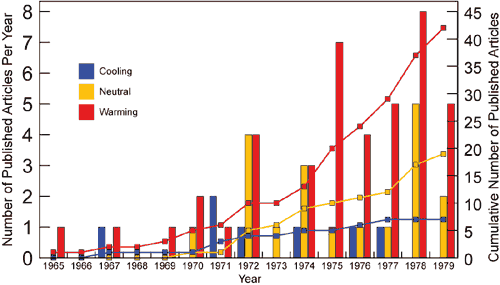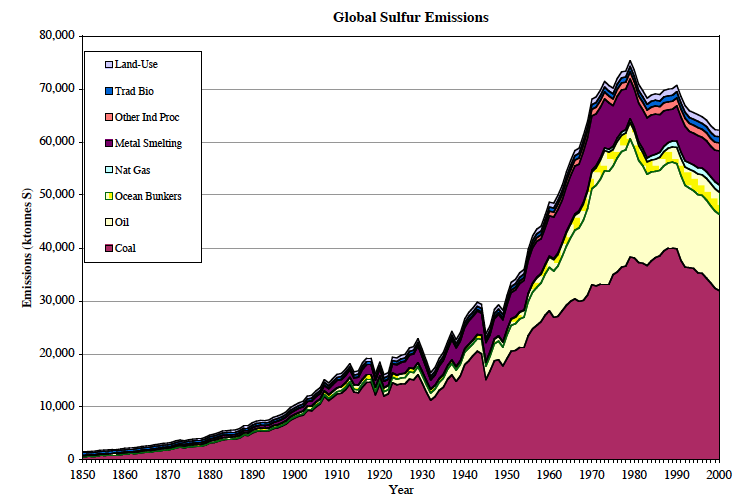 Arguments
Arguments
 Software
Software
 Resources
Comments
Resources
Comments
 The Consensus Project
The Consensus Project
 Translations
Translations
 About
Support
About
Support


Latest Posts
- Introducing the Climate Brink Dashboard
- Climate Adam - Climate Scientist Reacts to AI Overlords
- Trump just torched the basis for federal climate regulations. Here’s what it means.
- 2026 SkS Weekly Climate Change & Global Warming News Roundup #07
- Skeptical Science New Research for Week #7 2026
- These key strategies could help Americans get rid of their cars
- Fact brief - Can nearby solar farms reduce property values?
- Sea otters are California’s climate heroes
- 2026 SkS Weekly Climate Change & Global Warming News Roundup #06
- Skeptical Science New Research for Week #6 2026
- The future of NCAR remains highly uncertain
- Fact brief - Can solar projects improve biodiversity?
- How the polar vortex and warm ocean intensified a major US winter storm
- 2026 SkS Weekly Climate Change & Global Warming News Roundup #05
- Help needed to get translations prepared for our website relaunch!
- Skeptical Science New Research for Week #5 2026
- Climate Variability Emerges as Both Risk and Opportunity for the Global Energy Transition
- Fact brief - Are solar projects hurting farmers and rural communities?
- Winter 2025-26 (finally) hits the U.S. with a vengeance
- 2026 SkS Weekly Climate Change & Global Warming News Roundup #04
- Skeptical Science New Research for Week #4 2026
- WMO confirms 2025 was one of warmest years on record
- Fact brief - Do solar panels release more emissions than burning fossil fuels?
- Keep it in the ground?
- 2026 SkS Weekly Climate Change & Global Warming News Roundup #03
- Skeptical Science New Research for Week #3 2026
- Climate Adam - Will 2026 Be The Hottest Year Ever Recorded?
- Fact brief - Does clearing trees for solar panels release more CO2 than the solar panels would prevent?
- Where things stand on climate change in 2026
- 2026 SkS Weekly Climate Change & Global Warming News Roundup #02
Archived Rebuttal
This is the archived Intermediate rebuttal to the climate myth "Ice age predicted in the 70s". Click here to view the latest rebuttal.
What the science says...
|
1970s ice age predictions were predominantly media based. The majority of peer reviewed research at the time predicted warming due to increasing CO2. |
Mainstream Media
What was the scientific consensus in the 1970s regarding future climate? The most cited example of 1970s cooling predictions is a 1975 Newsweek article "The Cooling World" that suggested cooling "may portend a drastic decline for food production."
"Meteorologists disagree about the cause and extent of the cooling trend… But they are almost unanimous in the view that the trend will reduce agricultural productivity for the rest of the century."
A 1974 Time magazine article Another Ice Age? painted a similarly bleak picture:
"When meteorologists take an average of temperatures around the globe, they find that the atmosphere has been growing gradually cooler for the past three decades. The trend shows no indication of reversing. Climatological Cassandras are becoming increasingly apprehensive, for the weather aberrations they are studying may be the harbinger of another ice age."
Peer-Reviewed Literature
However, these are media articles, not scientific studies. A survey of peer reviewed scientific papers from 1965 to 1979 show that few papers predicted global cooling (7 in total). Significantly more papers (42 in total) predicted global warming (Peterson 2008). The large majority of climate research in the 1970s predicted the Earth would warm as a consequence of CO2. Rather than 1970s scientists predicting cooling, the opposite is the case.

Figure 1: Number of papers classified as predicting global cooling (blue) or warming (red). In no year were there more cooling papers than warming papers (Peterson 2008).
Scientific Consensus
In the 1970s, the most comprehensive study on climate change (and the closest thing to a scientific consensus at the time) was the 1975 US National Academy of Sciences/National Research Council Report. Their basic conclusion was "…we do not have a good quantitative understanding of our climate machine and what determines its course. Without the fundamental understanding, it does not seem possible to predict climate…"
This is in strong contrast with the current position of the US National Academy of Sciences: "...there is now strong evidence that significant global warming is occurring... It is likely that most of the warming in recent decades can be attributed to human activities... The scientific understanding of climate change is now sufficiently clear to justify nations taking prompt action." This is in a joint statement with the Academies of Science from Brazil, France, Canada, China, Germany, India, Italy, Japan, Russia and the United Kingdom.
In contrast to the 1970s, there are now a number of scientific bodies that have released statements affirming man-made global warming. More on scientific consensus...
- National Oceanic and Atmospheric Administration
- Environmental Protection Agency
- NASA's Goddard Institute of Space Studies
- American Geophysical Union
- American Institute of Physics
- National Center for Atmospheric Research
- American Meteorological Society
- The Royal Society of the UK
- Canadian Meteorological and Oceanographic Society
- American Association for the Advancement of Science
Reasoning Behind Cooling Predictions
Quite often, the justification for the few global cooling predictions in the 1970s is overlooked. Probably the most famous such prediction was Rasool and Schneider (1971):
"An increase by only a factor of 4 in global aerosol background concentration may be sufficient to reduce the surface temperature by as much as 3.5°K."
Yes, their global cooling projection was based on a quadrupling of atmospheric aerosol concentration. This wasn't an entirely unrealistic scenario - after all, sulfur dioxide (SO2) emissions were accelerating quite rapidly up until the early 1970s (Figure 2). These emissions caused various environmental problems, and as a result, a number of countries, including the USA, enacted SO2 limits through Clean Air Acts. As a result, not only did atmospheric aerosol concentrations not quadruple, they declined starting in the late 1970s:

Figure 2: Global sulfur dioxide emissions by source (PNNL)
Similarly, if we now limit CO2 emissions, we can also eventually get global warming under control.
Summary
So global cooling predictions in the 70s amounted to media and a handful of peer reviewed studies. The small number of papers predicting cooling were outweighed by a much greater number of papers predicting global warming due to the warming effect of rising CO2. Today, an avalanche of peer reviewed studies and overwhelming scientific consensus endorse man-made global warming. To compare cooling predictions in the 70s to the current situation is both inappropriate and misleading. Additionally, we reduced the SO2 emissions which were causing global cooling. The question remains whether we will reduce the CO2 emissions causing global warming.
Intermediate rebuttal written by John Cook
Update July 2015:
Here is a related lecture-video from Denial101x - Making Sense of Climate Science Denial
Updated on 2016-10-12 by pattimer.
THE ESCALATOR

(free to republish)
























































